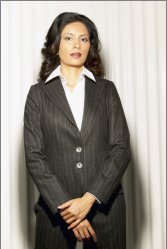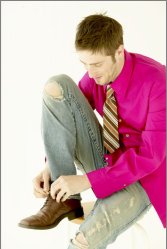Clothes Psychology: What Your Clothing Tells Others About Who You Are and Who You Want to Be
by www.SixWise.com
It's true that you shouldn't judge a book by its cover, but
people still do. In the case of human beings, that "cover"
is in large part your clothing and others are looking at it
to help gauge an impression of who you are.
|

A smart business suit exudes confidence and success.
(Consider how differently you'd perceive this woman
if she were dressed in a sloppy sweat suit.)
|
"Before you choose your outfit for the day, think about
how you want other people to see you and interpret your personality
… Your clothes say far more than you think," says
Bridget Allen a senior level fashion industry expert.
What do YOUR Clothes Say About You?
There are very few instances where your clothing doesn't
matter. This may sound shocking, but it's true. That's because,
even in instances where you're the only one who knows what
you're wearing, those clothes can affect your mood and how
you face the day.
With that in mind, take a look at some of the common clothing
personalities out there, and what they say about the wearer.
The Sloppy Dresser: If your clothes are wrinkled,
stained, or mismatched, others typically take this to mean
that in a figurative sense you are too. Sloppy clothing sends
the message that you don't really care … about your appearance,
your job, your future or otherwise.
The Designer Dresser: Every item on your body is brand
name, and you're sure to let others know it. People may take
this to mean you're successful, choosy and "put together,"
but they may think you're overly materialistic or a bit insecure
(and desperately trying to fit in via your clothing).
The Skimpy Dresser: Skimpy dressers always opt for
the shortest, tightest, most revealing clothing they can find
whether they're going to work, an office party or the beach
with their kids. Wearing overly revealing clothing often exudes
insecurity, and an attempt to gather attention based solely
on your body (perhaps suggesting that's all there is to offer).
Many say occasionally wearing that skimpy outfit is fun, flirty,
and quite acceptable, but wearing them all the time is likely
another matter.
The Business Casual Dresser: Business casual, when
done correctly (i.e. casual loafers, not flip flops), can
be a sign of a confident, well-meaning individual.
|

Looking to impress your new in-laws? An overly sloppy
outfit can tell them that you don't care.
|
The Flashy Dresser: Perhaps it's a fun pair of shoes,
a snappy tie or a bright blue handbag. It could be just about
any fashion piece, but you've always got to have something
to show your wild side. Flashy dressers often show others
that they're looking to be set apart from the crowd and have
a desire to show their personality and get noticed.
The Drab Dresser: Do you always dress in neutrals
and plain slacks and shirts, and never dare stray from this
uniform? A drab dresser can be an indication that you're trying
to blend in with the crowd and don't want a lot of extra attention.
The Athletic Dresser: Athletic dressers wear sweats,
running shoes and other workout gear 24/7, whether they're
heading to the gym or not. While this may show others that
you're athletic and care about your body, be careful. Athletic
dressers can easily be mistaken for sloppy dressers, particularly
when sweats are involved.
The Goth Dresser: Lots of black, fishnet stockings
and maybe a studded collar are often features of goth
dressers. While this look may tell some people that you're
expressing your personality, many may see you as depressed,
angry, insecure (needing to "disguise" yourself)
and unapproachable.
The Casual Dresser: This is the guy or gal who never
puts on anything but jeans and a t-shirt. Fine for a weekend
at home, but over time this look can make you appear one-sided
or lacking a creative flair or dimension.
How to Use Clothing to Your Advantage
In reality most people are a combination of clothing styles,
wearing casual clothes one day and business garb the next.
The key to using clothing to your advantage is to dress so
you feel ready to take on the world.
In fact, experts have found that dressing in this way has
a real impact on your mood and your outlook. Consider what
you wear to the gym.
"Putting on a flattering outfit motivates people to
actually go to the gym or to exercise outdoors in public,"
says performance coach Larina Kase, PsyD, MBA, president of
Performance and Success Coaching LLC in Philadelphia.
So what can you do to dress in a way that's beneficial for
you, your outlook and your attitude toward the world? Check
out these 10 simple tips.
-
Wear clothing that's flattering for your figure.
-
Remember that clothing doesn't need to be expensive
to look good.
-
Dress suitably for the occasion (business attire for
work is a must).
-
Don't be afraid to show your personality by using color,
unique clothing cuts or accessories.
-
Do step outside of your fashion comfort zone sometimes.
For instance, if you always dress in jeans and t-shirts,
put on a well-tailored suit and see how it makes you feel.
-
Have fun with your clothing. Don't take it too seriously.
-
Only wear clothing that makes you feel good.
-
Get rid of clothes that you associate negative things
with (such as the sweatshirt you wore for a month after
your divorce, or the sweater you put on when you have
a cold).
-
Do get "dressed" daily. It's easy to slip
into a pattern of throwing on anything, particularly when
you're not planning to go out anywhere special. However,
this can set your mood to expect a monotonous, ho-hum
day. Try putting on something special even when it's not
a "special" day, and take notice of the change
in your attitude.
-
Don't worry about keeping up with trends, but do update
your clothing regularly (and get rid of items from past
decades).
Recommended Reading
The
6+ Synthetic Fabrics You Most Want to Avoid, and Why
The
Powerful Influencing Effect of People's Faces on Your Behavior
Sources
Buzzle.com
MedecineNet.com